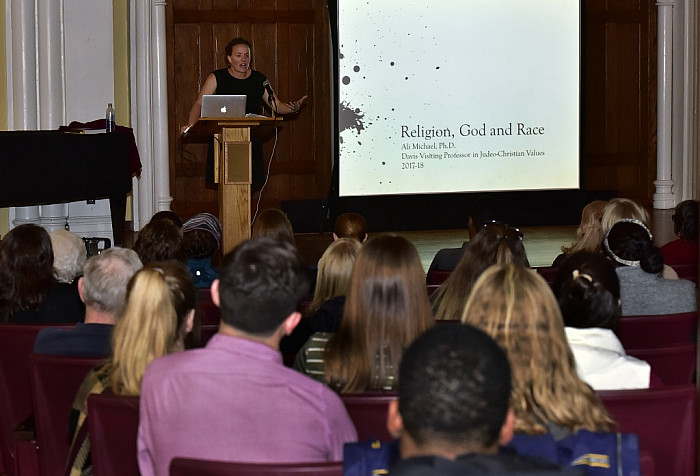Davis Lecture Explores Race and Religion
Ali Michael, co-founder and director of the Race Institute for K-12 Educators, discussed how her religious practice has impacted her anti-racism viewpoints.
“It helps me frame my engagement with racial justice as a practice,” said Michael, who teaches in the mid-career doctoral program at the University of Pennsylvania’s Graduate School of Education as well as the Graduate Counseling Program at Arcadia University.
“Racism fractures our world,” she told an audience of about 80 members of the Ursinus and neighboring community. “Part of healing is engaging in practices of antiracism, and in my work I strive for wholeness.”
This year, Michael served as Ursinus’s Davis Visiting Professor of Judeo-Christian Values. The professorship was established in 1988 through the generosity of Thomas G. and Nancy B. Davis. It enables the holder to examine Judeo-Christian values and embody them for the benefit of students and faculty, culminating in a lecture for the community.
Michael framed her talk around three key themes: religion, god and race. She traced her path from Christianity to Reconstructionist Judaism—which she explained is socially progressive and religiously conservative—and growing up in an all-white neighborhood outside of Pittsburgh.
“In my family, we never talked about race,” she said. “I believed that you should be colorblind and never see someone’s race. But if we don’t talk about race, we can never do anything about racism. Race has always been a social construction. It takes one physical feature and divides people into categories…and therefore, to different rights and different access to opportunities.”
“How does my religious practice impact my social justice practice,” she asked. “The oneness of humanity is the god I seek to know and Judaism allows me to explore and define god in a way that is extremely personal. Oneness of humanity is my personal theology. When we understand one another, we engage in the work of healing the world.”
Michael is the author of Raising Race Questions: Whiteness, Inquiry and Education (2015), which explores the opportunities and challenges that arise when white teachers deal directly with race and the role it plays in their classrooms. She is also co-editor of the bestselling Everyday White People Confront Racial and Social Injustice: 15 Stories (2015) and The Guide for White Women who Teach Black Boys (2018).
Her current research focuses on supporting teachers to mitigate the unintentional, pervasive effects of institutional and individual racism in the classroom setting. She also studies how white families racially socialize their children.
During her talk, she acknowledged the late Rev. Charles Rice, Ursinus’s longtime chaplain.
“Rev. Rice invited me to be part of the Ursinus community a couple of years ago,” she said. “I am better and my work is better because Rev. Rice believed in it and believed in me.” –By Ed Moorhouse
